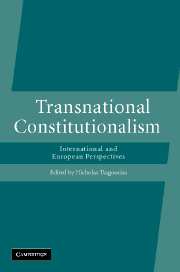Book contents
- Frontmatter
- Contents
- List of contributors
- Foreword by Malcolm D. Evans
- List of abbreviations
- Introduction – Constitutionalism: a theoretical roadmap
- Part I States, courts and constitutional principles
- Part II Transnational constitutional interface
- Part III Visions of international constitutionalism
- 9 The meaning of international constitutional law
- 10 The never-ending closure: constitutionalism and international law
- Index
9 - The meaning of international constitutional law
Published online by Cambridge University Press: 01 July 2009
- Frontmatter
- Contents
- List of contributors
- Foreword by Malcolm D. Evans
- List of abbreviations
- Introduction – Constitutionalism: a theoretical roadmap
- Part I States, courts and constitutional principles
- Part II Transnational constitutional interface
- Part III Visions of international constitutionalism
- 9 The meaning of international constitutional law
- 10 The never-ending closure: constitutionalism and international law
- Index
Summary
Two faces of a problem: sovereignty and constitutionalism in international law
At the end of an article about the concept of sovereignty in international law, I quoted Hans Kelsen and Wolfgang Friedmann. In spite of all their differences both legal scholars were strong supporters of an international constitutional order. It was, in fact, Friedmann who first produced a sketch of international constitutional law as a ‘new field of international law’. In the late 1920s, Kelsen referred to his time as a transitional period in the history of international law, and saw this character reflected in the ‘contradictions of an international legal theory which in an almost tragic conflict aspires to the height of a universal legal community erected above the individual states but, at the same time, remains a captive of the sphere of power of the sovereign state’. Almost 40 years later, Friedmann arrived at a very similar conclusion when he wrote:
In terms of objectives, powers, legal structure and scope, the present state of international organisation presents an extremely complex picture. It reflects the state of a society that is both desperately clinging to the legal and political symbols of national sovereignty and being pushed towards the pursuit of common needs and goals that can be achieved only by a steadily intensifying degree of international organisation.
- Type
- Chapter
- Information
- Transnational ConstitutionalismInternational and European Perspectives, pp. 307 - 328Publisher: Cambridge University PressPrint publication year: 2007
- 9
- Cited by



